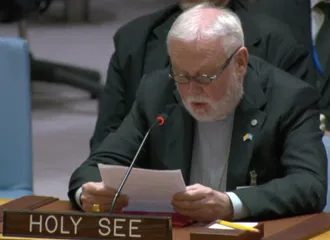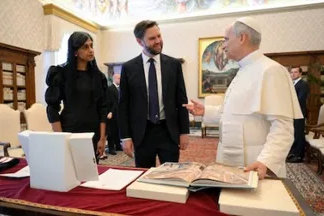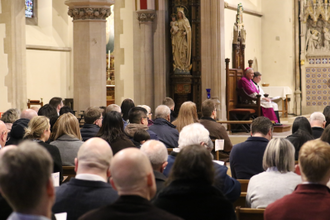Statement by Archbishop Gallagher at UN Security Council Debate on AI and International Peace and Security

Archbishop Paul Gallagher
Source: Holy See Mission
On 25 September, at the United Nations Security Council Open Debate on Artificial Intelligence and International Peace and Security, Archbishop Paul Richard Gallagher, Secretary for Relations with States and International Organizations of the Holy See, urged the States to ensure that AI development remains anchored in respect for human dignity and the common good.
The Head of Delegation highlighted both the promise and the risks of AI, noting its potential to advance peace, development, and human rights, while warning of its misuse in military applications, particularly lethal autonomous weapon systems (LAWS).
He called for an immediate moratorium on LAWS and a legally binding instrument to ensure decisions over life and death remain under meaningful human control.
He also expressed concern over the integration of AI into nuclear command systems and the emergence of a new arms race, stressing the need for ethical safeguards and international cooperation.
The Holy See reaffirmed its commitment to a human-centered approach to emerging technologies and urged the Security Council to uphold its responsibility in addressing the ethical and security implications of AI.
The full text of the statement follows.
Statement by His Excellency Archbishop Paul Richard Gallagher, Secretary for Relations with States and International Organizations, at the United Nations Security Council Open Debate on Artificial Intelligence and International Peace and Security
New York, 25 September 2025
Mr President,
The Holy See wishes to thank the Republic of Korea for convening this timely open debate on Artificial Intelligence (AI) and its implications for maintaining international peace and security.
Over the past few decades humanity has witnessed an extraordinary and rapid evolution of scientific and technological advancements. The digital revolution, particularly in the field of AI, is having a deep impact on areas such as education, employment, art, healthcare, governance, the military, and communication.[1]
AI has the potential to help achieve many of the aspirations that guided the creation of the United Nations eighty years ago, such as advancing sustainable development, maintaining international peace and security, and upholding fundamental human rights and freedoms.
At the same time, if the development and use of AI are not firmly anchored in respect for human dignity and the pursuit of the common good,[2] they risk becoming instruments of division and aggression, with the potential to fuel further conflict. This is not an abstract or distant concern, but an urgent reality given today's global instability and given the rapid integration of AI into conventional and nuclear weapon systems.
Mr President,
The development of lethal autonomous weapon systems (LAWS) raises grave legal, security, humanitarian, and ethical concerns for the international community, because they lack the unique human capacity for moral judgment and ethical decision-making.[3] For this reason, the Holy See strongly supports the adoption of an immediate moratorium on the development or use of LAWS, as well as a legally binding instrument to ensure that decisions over life and death remain under meaningful human control.
Equally concerning is the emergence of a new arms race marked by the integration of AI into military systems, including space assets and missile defence systems. Such developments risk altering the nature of weapons and warfare, creating an unprecedented level of uncertainty, due to the possibility of miscalculation. Notably incorporating AI into nuclear command and control introduces new unknown risks that extend far beyond the already fragile and morally troubling logic of nuclear deterrence.
Mr President,
In order to address these pressing issues, the Holy See calls for a human-centered approach to the development and use of emerging technologies. This Council, entrusted with the primary responsibility for maintaining international peace and security, must pay close attention to scientific and technological progress as it debates this matter. It should also recognize that certain applications, such as technology that replaces human judgment in matters of life and death, cross inviolable boundaries that must never be breached.
Thank you, Mr President.
[1] Cf Pope Leo XIV, Message on the occasion of the "AI for Good" Summit 2025, signed by Cardinal Pietro Parolin, Secretary of State.
[2] Cf Dicastery for the Doctrine of the Faith and Dicastery for Culture and Education, Antiqua et Nova, 14 January 2025.
[3] Cf Dicastery for the Doctrine of the Faith and Dicastery for Culture and Education, Antiqua et Nova, n. 100, 14 January 2025.


















